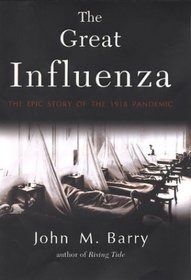Did you know: The regular old influenza that hits every year kills more people than AIDS - around 36,000 deaths a year in the United States alone. The influenza pandemic in 1918-1919 killed more people in 24 weeks than AIDS has killed in 24 years.
Mr. Barry brought up an interesting question. Should the 1918 influenza virus genetic code be published? It would, of course, help scientists around the world develop potential vaccines and even better medications. It could also give sophisticated terrorists another powerful weapon. I didn't try to find out if it's been published yet.
There are dangers to reading this book on an airplane in December, as I did, listening to people all over the plane cough and sneeze their germs into the air. I'm not sure I'd recommend that plan.
From the struggle to elevate American "medical schools" to real schools of learning, through the push to develop American medical laboratories able to confront epidemics, during the efforts of the Wilson administration to dominate every aspect of life during World War I, and the petty local politics that resulted in thousands of needless deaths, this book offers an amazing view of American history that should be taught in our colleges, and offered as an elective in high schools.
I highly recommended it to all my friends and anyone interested in American history, medical or otherwise.
Sometimes the detailed medical science can be a little dry to those not interested in that field, but overall, this is one of the best books I have ever read on diseases, and I've read dozens. It will change the way you look at our history.
If you have a choice between this and "Flu : The Story Of The Great Influenza Pandemic" by Gina Kolata, skip Kolata's book. This is the one to read.
It briefly discusses the differences between science practiced in Europe in the last half of the nineteenth century differed from superficially similar ¨science¨ before that time. This touches, in my mind, on the topic of Islamic science, i.e. discussions of al-Razi and al-Biruni and Islamic civilization´s advances, etc. My position is that, without taking away from any of the historical geniuses who were able to discover facts about the universe and without denying that societies in the past employed these advances where they were able, the modern scientific enterprise is almost entirely different on the social, epistemological and organizational levels as to make comparisons with earlier efforts meaningless. A previous review in this blog deals with this topic as well. One of the keys to good science and good public health is freedom from government and popular coercion. In this book, censorship mandated and encouraged by the United States government in its efforts to prosecute World War I resulted in poor public health efforts. Pandemic influenza is serious business, and we must press leaders at all levels to prepare a respose to a pandemic when it comes. For Muslim organizations, should we at least have a discussion now regarding things like gathering for jumu'a and funeral prayers rather than wait for the pandemic to strike and then have these discussions when emotions will cloud our judgments?




